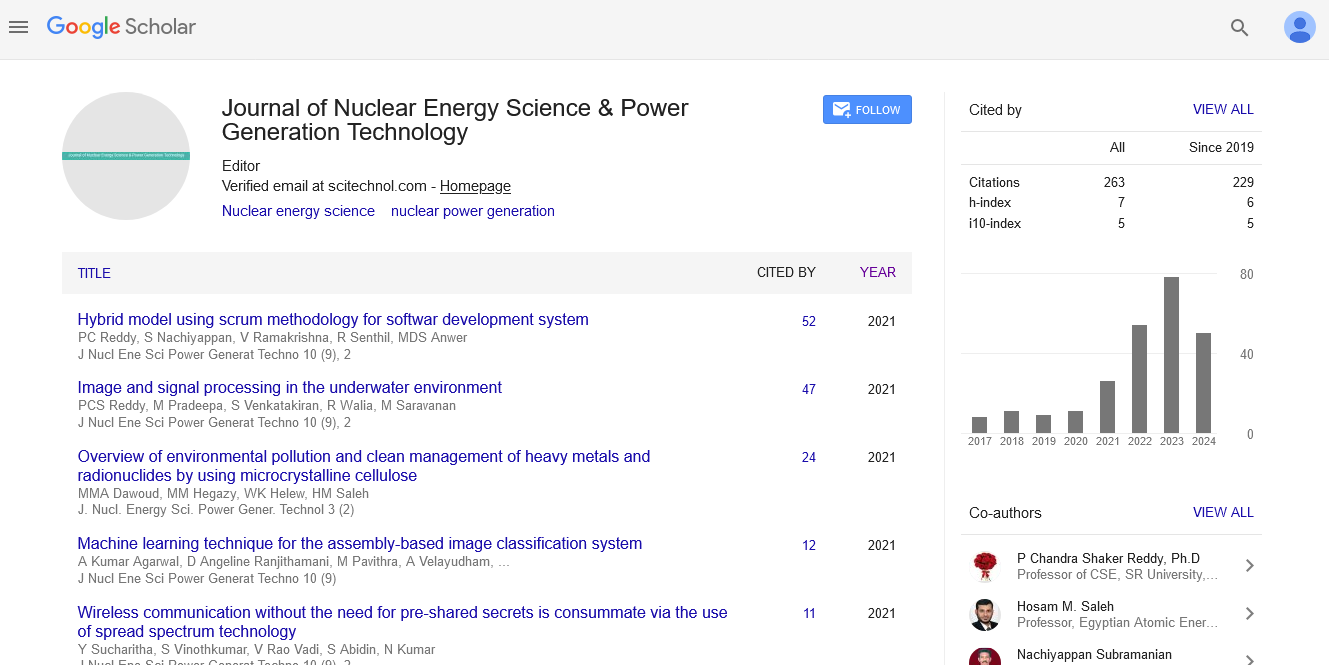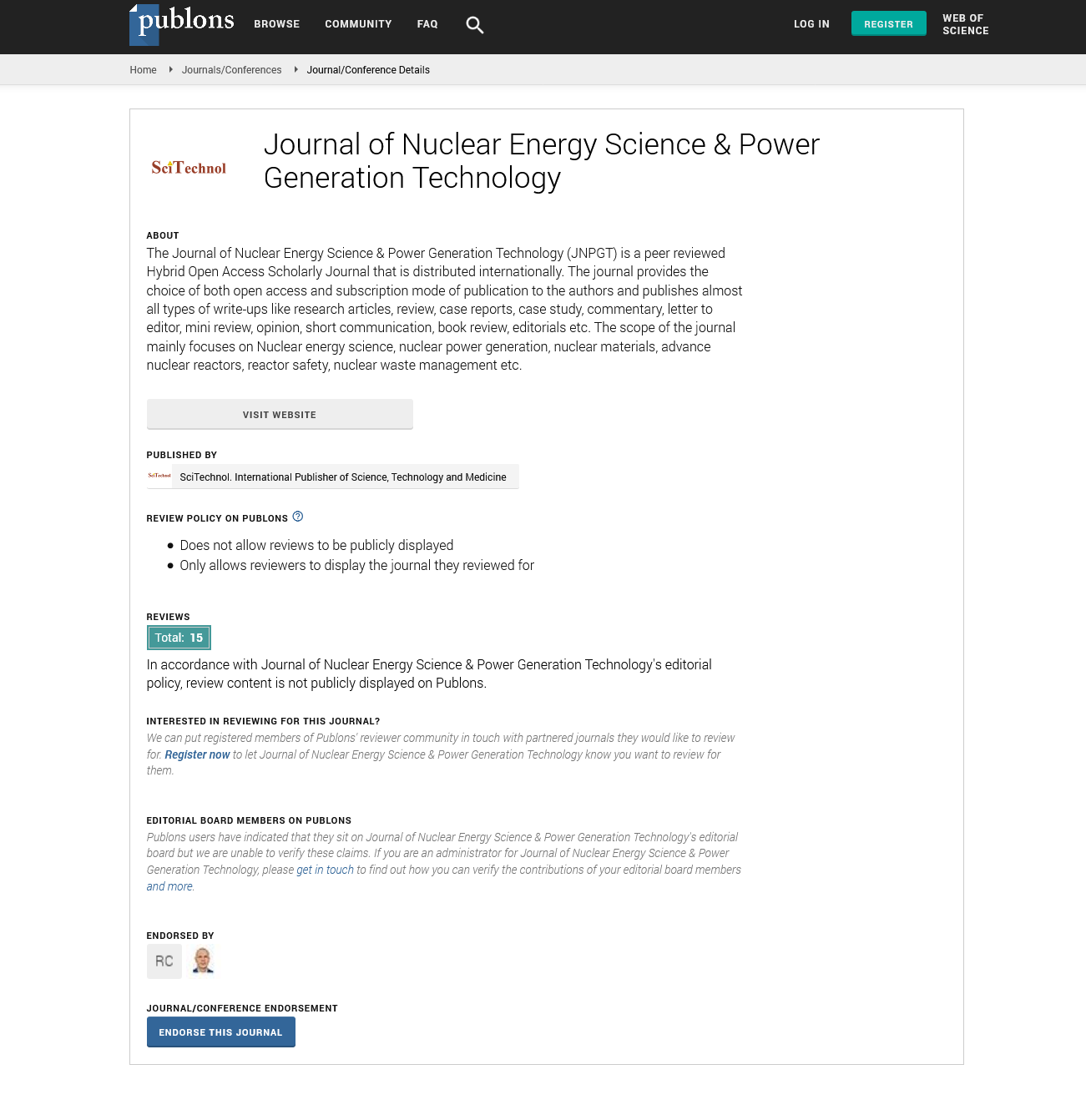Commentary, J Nucl Ene Sci Power Generat Technol Vol: 13 Issue: 2
Design, Optimization, and Operation of Reactor System
Praazar Kein*
1School of Electric Power, South China University of Technology, Guangzhou, China
*Corresponding Author: Praazar Kein,
School of Electric Power, South China
University of Technology, Guangzhou, China
E-mail: praazar_kein123@gmail.com
Received date: 13 February, 2024, Manuscript No. JNPGT-24-133573;
Editor assigned date: 15 February, 2024, PreQC No. JNPGT-24-133573 (PQ);
Reviewed date: 29 February, 2024, QC No. JNPGT-24-133573;
Revised date: 07 March, 2024, Manuscript No. JNPGT-24-133573 (R);
Published date: 15 March, 2024, DOI: 10.4172/2325-9809.1000390.
Citation: Kein P (2024) Design, Optimization, and Operation of Reactor System. J Nucl Ene Sci Power Generat Technol 13:2.
Description
Reactor engineering lies at the heart of the modern energy landscape, shaping the way power from nuclear, chemical, and renewable sources. Whether it's producing electricity, synthesizing fuels, or driving industrial processes, reactors play a vital role in meeting society's energy need the fascinating world of reactor engineering, exploring its principles, innovations, and impact on the future of energy. At its essence, reactor engineering involves the design, optimization, and operation of systems that facilitate chemical or nuclear reactions to produce desired outcomes. These reactions may involve the conversion of raw materials into useful products, the generation of heat for power generation, or the synthesis of novel materials with unique properties.
Engineers must carefully select reactor configurations, materials, and operating conditions to achieve desired performance outcomes while ensuring safety, efficiency, and reliability. Reactor designs vary widely depending on the nature of the reaction, scale of operation, and specific requirements of the application. Efficient heat transfer is essential for maintaining optimal reactor temperatures and maximizing energy conversion efficiency. Engineers employ various heat exchange mechanisms, such as conduction, convection, and radiation, to manage thermal loads and control reaction kinetics. Fluid flow patterns within reactors influence mass and heat transfer rates, reaction kinetics, and mixing efficiency. Computational Fluid Dynamics (CFD) simulations enable engineers to optimize reactor geometries and operating parameters to enhance performance and minimize energy losses. Reactor operation requires precise control of process variables, such as temperature, pressure, flow rate, and composition, to maintain stable operation and ensure product quality. Advanced control algorithms and instrumentation technologies enable real-time monitoring and regulation of reactor conditions.
Innovations in reactor engineering
Advanced reactor designs, including Small Modular Reactors (SMRs), Molten Salt Reactors (MSRs), and High-Temperature Gas- Cooled Reactors (HTGRs), provide enhanced safety, fuel utilization, and proliferation resistance compared to conventional light-water reactors. These innovations pave the way for a new era of nuclear energy that is safer, more sustainable, and cost-competitive. Catalytic reactors, membrane reactors, and microreactors are transforming chemical processes by enabling selective and efficient conversion of feedstocks into valuable products with minimal energy consumption and environmental impact. These innovations unlock new pathways for sustainable chemical synthesis, renewable fuel production, and emissions reduction. Reactor engineering plays an important role in advancing renewable energy technologies, such as solar photovoltaics, wind turbines, and bioenergy systems. Integrated reactor designs and energy storage solutions enable grid stability, load balancing, and dispatch ability, overcoming challenges associated with intermittency and variability of renewable resources. Reactor engineering contributes to carbon capture and utilization efforts by developing innovative reactor designs for CO2 capture, conversion, and utilization. Chemical looping reactors, electrochemical reactors, and biological systems provide pathways for reducing greenhouse gas emissions and climate change.
Conclusion
Reactor engineering continues to drive innovation and transformation across diverse sectors, shaping the future of energy and sustainability. By advanced materials, computational tools, and multidisciplinary approaches, engineers are poised to develop nextgeneration reactors that are safer, more efficient, and environmentally friendly. From nuclear power plants to chemical refineries to renewable energy systems, reactors are the backbone of modern civilization, providing the energy and resources needed to power our world. As confront the challenges of climate change, resource depletion, and energy security, reactor engineering will play a central role in developing sustainable solutions that meet the needs of present and future generations. Through collaboration, creativity, and ingenuity, can engineer a brighter, more sustainable future for all.
 Spanish
Spanish  Chinese
Chinese  Russian
Russian  German
German  French
French  Japanese
Japanese  Portuguese
Portuguese  Hindi
Hindi 

